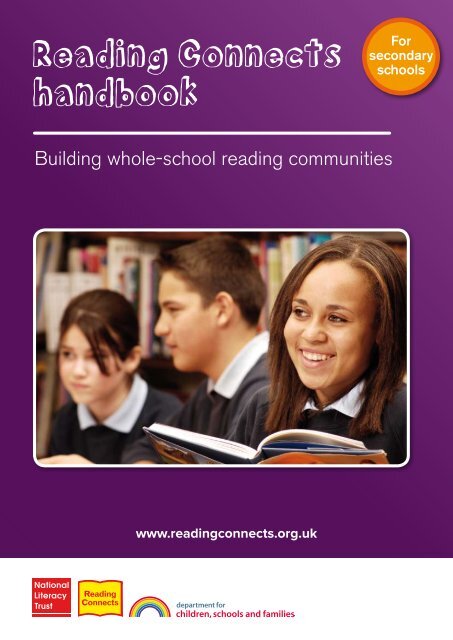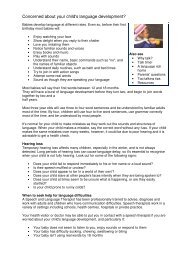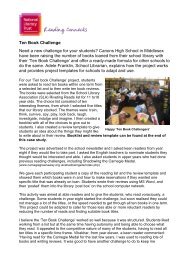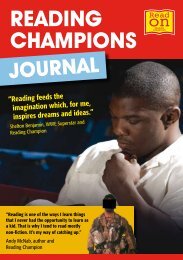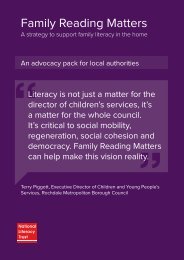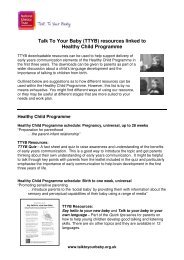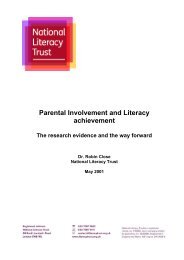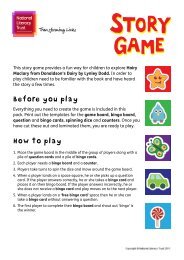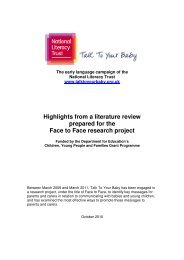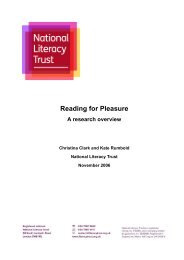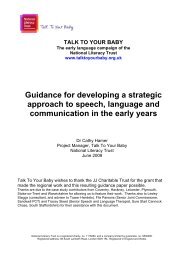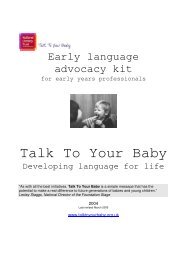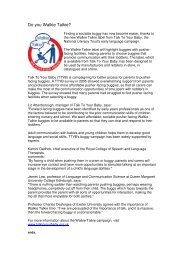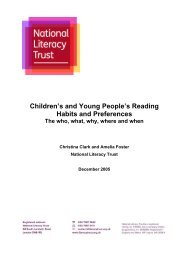Reading Connects handbook - National Literacy Trust
Reading Connects handbook - National Literacy Trust
Reading Connects handbook - National Literacy Trust
Create successful ePaper yourself
Turn your PDF publications into a flip-book with our unique Google optimized e-Paper software.
Welcome to<strong>Reading</strong> <strong>Connects</strong>Congratulations, you are now a <strong>Reading</strong> <strong>Connects</strong> school! This <strong>handbook</strong> is divided into eight sections designed tohelp you develop reading for pleasure across every strand of school life. Each section offers advice, practical ideasand signposting to resources. Of course, it is not possible to develop every area at once. We suggest you completethe audit to start with, as it will help you to identify which strands in the <strong>handbook</strong> you want to focus on first.There is only so much information that we can include in this <strong>handbook</strong>. However, if you visitwww. readingconnects.org.uk, you will find more practical ideas, resources, case studies and research related toeach of the strands below.ContentsBuilding a whole-school reading community– an overview by Gerry Swain4School library26The <strong>Reading</strong> <strong>Connects</strong> approach6Special interest groups31The <strong>Reading</strong> <strong>Connects</strong> audit8Transition34Whole-school vision, policy and strategy12Family involvement36<strong>Reading</strong> promotion17Community involvement39<strong>Reading</strong> events and groups21The reading calendar42www.readingconnects.org.uk3NLT0171_<strong>Reading</strong> <strong>Connects</strong> Handbook_Secondary_AW.indd 3 24/10/08 14:05:08
The real power of being a member of <strong>Reading</strong><strong>Connects</strong> is that you are helped to infuse the wholeestablishment with great ideas for promoting readingand to maintain excitement about it. <strong>Reading</strong> <strong>Connects</strong>and the work of the <strong>National</strong> <strong>Literacy</strong> <strong>Trust</strong> enable thecreativity and energy of individuals to be combined andnurtured so they flourish and gain inspiration together,rather than burn out. The <strong>National</strong> Strategies is an activeand enthusiastic partner for <strong>Reading</strong> <strong>Connects</strong>. I hopeyou will enjoy and are able to take full advantage of this<strong>handbook</strong> and of the networks and resources <strong>Reading</strong><strong>Connects</strong> offers.www.readingconnects.org.uk5NLT0171_<strong>Reading</strong> <strong>Connects</strong> Handbook_Secondary_AW.indd 5 24/10/08 14:05:12
The <strong>Reading</strong><strong>Connects</strong> approachThe following advice, basedon successful approaches insecondary schools, should helpget you started and could beadapted for your school. However,before you even start on step one,if you are not a member of thesenior management team (SMT),you need to make sure that youhave their support. Page 12 ofthis <strong>handbook</strong> has some usefulinformation for doing just that.12Form a small steering group of about four tofive staff members, including one member ofSMT, to lead the projectBe sure to include real enthusiasts inyour group, who will run with the idea ofembedding reading for pleasure across thewhole school community. Make sure that atleast one member of the SMT (if possible theheadteacher) is involved, as this will be vital inovercoming potential barriers. Meet as a groupat least once every half-term to discuss yourprogress. If possible, secure a day per term forone or more of the group to be freed from theclassroom to work on the project.Complete the <strong>Reading</strong> <strong>Connects</strong> auditThe self-evaluation tool on pages 8-11(also available online) will give your steeringgroup the opportunity to look at the school’scurrent reading for pleasure provision and seewhich areas need development.345Survey the students in your schoolTo get some baseline data and enable you tomeasure the impact of the project, survey thestudents about their attitudes to reading assoon as possible and then again at appropriateintervals. You may also like to correlate thisdata with the attainment levels of (some) youngpeople as they progress throughout the yearto see if their improved attitudes to readingand more frequent reading has an impact ontheir achievement. There is a sample survey formeasuring attitudes to reading available fromthe resources section of the website.Get all your colleagues on boardIf you are going to make a real difference, awhole-school commitment is really important.Use your enthusiasts to get the rest of thestaff on board and encourage all teaching andnon-teaching staff to support the project. Youmay not get full support from staff from day one,but it is worth persevering. The rest will comeon board as the initiatives you run gather paceand they see the enthusiasm of the students. Ifyou are looking for recruitment tools to use forstaff meetings and Inset, there are a number ofresources on the <strong>Reading</strong> <strong>Connects</strong> website,including short films, PowerPoint presentationsand research extracts.Make reading for pleasure as visible aspossible in school<strong>Reading</strong> won’t escape people’s minds if it hasan omnipresent visual profile – in classrooms, incorridors, in outside spaces, in the school hall,in the toilets, in the foyer… everywhere. Makingreading visible is a simple but effective way toget work going. The reading promotion sectionof the website has some great ideas for makingreading visible. The ‘Champions read’ postersNLT0171_<strong>Reading</strong> <strong>Connects</strong> Handbook_Secondary_AW.indd 6 24/10/08 14:05:12
6are also a good way to use famous readingrole models to promote reading; they can beaccessed from the <strong>Reading</strong> <strong>Connects</strong> website.Focus on further areas to strengthenyour projectThe <strong>Reading</strong> <strong>Connects</strong> audit covers alot of different areas and will help you toprioritise which to work on first. However, thefollowing three areas need to be a part of anydevelopment work that you do and will helpstrengthen all of the other strands:• Encourage reading in the homeIf the project is going to make a genuinedifference, getting families involved in yourproject is essential. The <strong>Reading</strong> <strong>Connects</strong>family involvement toolkit, included in yourwelcome pack, provides lots of ideas andstrategies for working with a range of families.• Work with your local library servicesYour local library services – public library andSchool Library Service – will be in a goodposition to help your school by providingcreative activities, a wide range of readingmaterials and staff expertise.• Develop your school libraryA great school library will help support a lot ofyour other reading activity. So if your schoollibrary needs a bit of attention, or a lot ofattention, make sure it is one of your priorityareas. A well-stocked and well-staffed schoollibrary will provide a hub for developing otherareas in the audit, such as reading groups,events or transition projects.This has hopefully given you some food for thought forgetting going. The <strong>Reading</strong> <strong>Connects</strong> website also hasa page signposting you to possible funding streams, aswell as information on potential barriers and solutions.<strong>Reading</strong> <strong>Connects</strong> wants to hear from youWe are always really keen for you to tell us about yourexperiences of developing a whole-school readingculture, so that we can share your good practice withother schools and local authorities. If you would liketo write a case study for the website (and raise theprofile of your great work at the same time) pleasevisit the website and download a template from theresources section.Good luck!The <strong>Reading</strong> <strong>Connects</strong> teamwww.readingconnects.org.uk7NLT0171_<strong>Reading</strong> <strong>Connects</strong> Handbook_Secondary_AW.indd 7 24/10/08 14:05:16
The <strong>Reading</strong><strong>Connects</strong> auditArea of focus Developing Establishing EnhancingWhole-school vision, policy and strategyWhole-schoolstrategyWhole-staffengagementPromoting reading forpleasure is part of theschool improvement plan(SIP). One staff memberleads on this and all staffare aware of this priority.All teaching staff activelypromote reading in andout of lesson time.Promoting reading forpleasure is an ongoingpart of the school strategyto raise standards and isan important part of theSIP. Staff are involved indelivering this strategy.<strong>Reading</strong> advocacyuses staff members asrole models.Promoting reading for pleasureis central to the school’s policyto achieve and enjoy. It formsan important foundation forimprovement within the SIP.<strong>Reading</strong> celebration andadvocacy involves all groups inthe wider school community,including catering staff,caretakers, governors andparent groups.ContinuingprofessionaldevelopmentStaff member in chargeof the library hasopportunities to attendtraining on reading issues.Adult/children’s bookrecommendationshave a regular slot instaff briefings.Providing ideas for promotingreading is integrated into theschool’s Inset programme.Cross-curricularlinksSubject leaders compiletopic booklists andteachers use some classtime to promote readingrelated to curriculum areas.Use of library for widerreading and researcharound topic areasis integrated intoschemes of work acrosscurriculum areas.Curriculum delivery integratesdeveloping readingindependence and promotingreading for pleasure andresearch in class and beyond.Monitoringpupils’attitudes toreadingInformation is collectedfrom pupils with specialeducational needs throughsurveys to establish theirattitude to reading andinform planning/support.Information is collectedfrom gifted and talentedpupils and pupils fromvulnerable backgroundsthrough surveys toestablish their attitudesto reading and informplanning/support.All pupils’ attitudes to readingare monitored throughout KS1and KS2 via journals or othermethods. This information isused to personalise provisionand meet individual needs.PupilinvolvementPupils’ opinions andrecommendationsare sought whenplanning reading forpleasure promotion.Pupils are involved inplanning and deliveringthe school’s reading forpleasure promotion.Pupils are a central partand have a lead role inplanning and deliveringthe school’s reading forpleasure promotion.NLT0171_<strong>Reading</strong> <strong>Connects</strong> Handbook_Secondary_AW.indd 8 24/10/08 14:05:16
This audit, on pages 8-11, is a useful tool for you to review your currentreading for pleasure provision. It provides an overview of the areaswhere you have developed a strong reading culture and also thosewhere there is room for more focus. You may like to revisit this audit at alater date to see where your school has made progress.Area of focus Developing Establishing Enhancing<strong>Reading</strong> promotionVisibility ofreadingThe foyer, corridors andclassrooms celebrate alltypes of reading, includingpupil recommendations.School publicity material,including websites andnewsletters, promotes theimportance of all typesof reading.Pupil involvement in ensuringthe visibility of reading forpleasure throughout theschool is maintained inboth an imaginative andinteractive way.Peer-to-peerrecommendationSome peer-to-peerrecommendation takesplace between pupils.A system for peer-to-peerreading recommendations(using the school ICTsystem) is establishedthroughout the schoolcommunity.Pupils play an important role inrunning the system for peer-topeerreading recommendation.ICTPupils are encouraged touse the internet to postbook reviews, recommendreading materials etc.Pupils use multimedia topromote reading activity inthe school.School uses web technologyto link with other schools onreading projects – for example,using video conferencing todevelop international links.<strong>Reading</strong> events and groups<strong>Reading</strong> events<strong>Reading</strong> is promotedduring school events andin school assemblies.Several reading eventsare held each year, linkingin with national eventssuch as World Book Dayand <strong>National</strong> Children’sBook Week.Special interest readinggroups run regularly and/or groups are run that linkin with national schemes,such as Greenaway, orlocal book awards.<strong>Reading</strong> promotion events takeplace regularly throughout theyear including a school bookweek/reading focus week.<strong>Reading</strong>groupsPupil reading groupsrun regularly.Parents, staff and the widerschool community take part inschool reading groups. Pupilshave a lead role in organisingpupil reading groups.BuddyingSome in-class or crossyear-groupbuddy readingtakes place.In-class, cross-year-groupor primary-secondaryschool buddy readingtakes place throughoutschool regularly.Pupils are central todeveloping and sustainingschool buddying scheme.www.readingconnects.org.uk9NLT0171_<strong>Reading</strong> <strong>Connects</strong> Handbook_Secondary_AW.indd 9 24/10/08 14:05:16
continued...Area of focus Developing Establishing EnhancingSchool librarySchoollibrary/corneraccessibilityand displayStockPupilinvolvementSpecial interest groupsLibrary is welcomingand resources areeasily accessed.As well as a good rangeof fiction and non-fictiontitles, the school librarystocks magazines,newspapers, comics etc.Pupils are involved insuggesting and selectingsome of the school’sreading resources,with pupils’ choicesclearly marked.Clear signage andinteresting displaysencourage library use withpromotions related to thecurriculum. Libraryis open throughout theschool day.Classrooms have a classlibrary corner whichis well stocked andregularly updated. Itincludes children’s ownpublished work.Pupil librarians are trainedto maintain and developschool library.School or class library ispresented in bookshop style,and is also open beyond theschool day.Library has a well stockedsection for pupils’ parents/carers and wider familymembers who are emergentadult readers.Pupil involvement in selectionof school reading resourcesand library management isintegral to the system.BoysSchool promotes readingmaterials and bookliststargeted at boys.Boys’ reading clubsand reading eventsrun regularly.School runs an effectiveproject involving boyspromoting reading for all ages– for example, the <strong>Reading</strong>Champions scheme.Pupils andfamiliesfrom diversecultures andbackgroundsA range of dual languagetexts or appropriatematerials reflecting pupils’diverse cultures andbackgrounds is availablefor pupils to borrow.School systems promotingreading for pleasureand reading groups areestablished to meetthe needs of pupilsfrom diverse culturesand backgrounds.Pupils and families fromdiverse cultures andbackgrounds are involved inpromoting reading to pupils.TransitionYear 6 to 7Specific ideas are usedto ease transition – forexample, Year 6 pupilssend suggested holidayreads to their new schoolfor display on their entryto Year 7. Procedurespromote progression inreading from year to year.Regular initiatives aidtransition – for example,visits by Year 7 and olderpupils for reading activities.School develops a readingfor pleasure strategy withlocal secondary schools toease transition, and pupils’views are taken into accountduring planning.NLT0171_<strong>Reading</strong> <strong>Connects</strong> Handbook_Secondary_AW.indd 10 24/10/08 14:05:16
Area of focus Developing Establishing EnhancingFamily involvementSupportFamily eventsand activitiesAll parents/carersare made aware ofthe importance ofencouraging theirchildren to read and howthe school can supportthem through materialseg booklists and topreading tips.<strong>Reading</strong> for pleasure ispromoted during schoolevents and activities towhich family members/carers are invited.Communication methodsare adapted to suit targetgroup of parents/carers.Some parents/carersthemselves are usedas advocates.Family reading events/activities are run during theyear and some parents/carers are involved inthe planning.Parents/carers are offeredregular support sessions onchoosing reading materialsand reading with childrenin KS1 and KS2. Regularfeedback from parents/carers and children is used toinform planning.Family reading events/activitiesare run for target groups – forexample, dads, grandparentsor families for whom English isan additional language.Adult basicskills provisionInformation is signpostedfor parents/carers toimprove their literacy skillswhere appropriate.Links are in place withfamily learning services tohelp identify parents andwider family members whostruggle with literacy skills.The services of a family learningcoordinator are available inschool to help parents/carersand wider family membersimprove their own literacy skills.Community involvementWorking inpartnershipwith otherschoolsPublic library /School LibraryService (whereappropriate)School liaises with otherschools in the areato develop and sharereading for pleasure ideas.School encourages pupilsto use the public library,and displays informationleaflets from library. Schoolsubscribes to SLS (whereit exists).School holds readingevents with other schools.Class visits to library andvisits from the children’slibrarian/SLS take place.School liaises withlocal library on Summer<strong>Reading</strong> Challenge.School develops reading forpleasure strategies and sharesgood practice with a group ofschools in the area as part ofan authority-wide focus.Joint projects and events areheld by school and publiclibrary and/or SLS. Pupils arepart of focus groups.Involvingorganisationsand adults fromthe communityCommunity members/organisations regularlysupport reading in school– for example, through avolunteer reading scheme.School works withcommunity organisationson project(s) to promotereading among pupils.Community organisations,including possible businesspartnerships, are involvedthrough coordinating readingactivity in joint projectswith schools.www.readingconnects.org.uk11NLT0171_<strong>Reading</strong> <strong>Connects</strong> Handbook_Secondary_AW.indd 11 24/10/08 14:05:16
Whole-school vision,policy and strategyWhole-school strategyThe key to building a whole-school reading communityis support from the senior management team. Withoutthe backing of the headteacher, even the mostenthusiastic reader development activity can onlyachieve so much. Headteacher support will mean thatit becomes a priority for the school and its progress willbe monitored as part of school’s evaluation process;it will feature in the School Improvement Plan; and itwill (hopefully) be allocated the necessary budget andresources (staff, space and time).This page clarifies how the <strong>Reading</strong> <strong>Connects</strong>approach can help your school meet its targets toraise academic standards and support your students’personal development.The benefits of being a frequent and enthusiastic readerare well documented. The more you read and enjoyreading, the better and more confident you becomeat reading and the more you want to do it. Creatingskilled, confident readers who are eager to access thecurriculum is the fundamental way in which the <strong>Reading</strong><strong>Connects</strong> approach can help your school.This approach can also help your school work towardssome of the Every Child Matters (ECM) outcomes andmeet the related local authority <strong>National</strong> Indicators.Creating a culture that promotes reading for pleasurehelps young people to enjoy and achieve, make apositive contribution and, consequently, to achieveeconomic wellbeing later in life.Enjoy and achieveThe <strong>Reading</strong> <strong>Connects</strong> approach can help you to meetyour local authority target for:• Progression by two levels in English between keystage 2 and key stage 3, and between key stage 3and key stage 4• Achievement at level 5 or above in English atkey stage 3• Achievement of five or more A*-C GCSEs(including a GCSE in English)To address the achievement gap, <strong>Reading</strong> <strong>Connects</strong>supports schools in working with young people andfamilies where there is little or no culture of reading inthe home. This can help you to:• Reduce the achievement gap between pupils eligiblefor free school meals and their peers achieving theexpected level at key stage 4.The <strong>Reading</strong> <strong>Connects</strong> approach also advocatesinclusivity, suggesting ways in which schools canencourage boys, young people from ethnic minoritiesand those with special educational needs (SEN) to lovereading. This support may help you to fulfil specifictargets related to reducing the SEN gap and raisingattainment for black and minority ethnic groups.Make a positive contributionA central theme for developing an enhanced readingculture is to encourage the students in your school toplay an active role in the process. This relates directly tothe ECM outcome ‘making a positive contribution’ andthe associated target which requires all young peopleto participate in positive activities.No matter which way you look at it, a readingcommunity is a learning and thinking community. Therecan be few better ways to improve students’ chancesat school, and beyond, than to enable them to becometruly independent readers. Now that the case has beenestablished for making this a whole-school priority,read on and find out the exciting ways in which you canmake it a reality.NLT0171_<strong>Reading</strong> <strong>Connects</strong> Handbook_Secondary_AW.indd 12 24/10/08 14:05:16
Case studyCollaboration’s what you need, if youwant to be a MegaReaderKatherine Davidson, learning resource centre manager at Ellis GuilfordSchool in Nottingham, tells us more about their umbrella approach.Since January 2007, the headteachers at Ellis Guilfordand six of its feeder primary schools have placed readingat the top their agendas by agreeing to develop strongreading cultures in each school using a joint strategycalled MegaRead.We needed to get support from the staff in all sevenschools – that’s a lot of people to convince! One of themost important initial decisions made was to collectivelyfund the post of LRC assistant manager to workalongside myself.The headteachers were extremely supportive, funding afull staff joint Inset called ‘Building whole-school readingcommunities together’. This was an important step inraising awareness of the role staff would have in helpingto achieve our aims.project, as well as our Young Cultural Creators project,and our student council has been given a readerdevelopment budget.Despite low literacy levels in all of our schools, theMegaRead approach is having an impact. We tested ourYear 7 cohort in September 2007 and July 2008, andfound that 68.6 per cent improved their standardisedscore. Futhermore, more of our students now also enjoyreading. More students are regular users of the LRCand our book issues have more than doubled from theprevious academic year.We’ve got a way to go, but reading is now high on all ofour agendas and it is working. An English teacher at ourschool summed this up perfectly: “I think we’ve shownthat if everybody does a bit, it makes a big difference.”Whole-school vision, policy and strategySince then, there has been a packed calendar of eventsand activities in all of the schools: a Question of Sportfamily reading event, a Mad Manga Mondays club,participation in the Nottingham Children’s Book Award byall schools, a community mural project and Jamie Murraybecoming our very own <strong>Reading</strong> Champion, to mentionjust a few.Ellis Guilford School and Sports College in Nottinghamwas the <strong>Reading</strong> <strong>Connects</strong> secondary school of the yearfor 2007/08. You can read their case study in full onthe website.Every two months we showcase all the great readingprojects to share good practice. We also hold half-termlyMegaRead meetings with representative staff fromeach school, to ensure that our reader campaign keepsmoving and is coordinated.Getting the students involved in planning and runningactivity was also essential as they know what worksbest. They had lots of input during the community muralImage: Nottingham Evening Postwww.readingconnects.org.uk13NLT0171_<strong>Reading</strong> <strong>Connects</strong> Handbook_Secondary_AW.indd 13 24/10/08 14:05:18
Whole-staff engagementIt will probably take a bit of time and it will needperseverance, but getting all of your staff on board willcertainly be worth it. And in saying staff, we mean allstaff, including midday supervisors, caretakers, parent(teacher) councils and governors, the SMT, teachers andteaching assistants. Given the impact that reading canhave, everyone needs to see encouraging the studentsto read as a personal responsibility in some way.Some members of staff will play a more central roleof course, but everyone in school can take on somekind of reading challenge. This could be somethingas simple as leaving out whatever they are readingat a desk or work station. It could mean taking partin a Get Caught <strong>Reading</strong> poster campaign. Why notmake a menu of reading challenges for your staff tochoose from?For teaching staff specifically, it is vital that they havea good knowledge of a wide variety of books aimedat teenagers and also have the confidence to usethem in the classroom. As you know, teachers are verybusy people and may find it hard to keep up to date.However, librarians have an extensive knowledge ofbooks for young people and love to enthuse aboutit. So, you might like to think about suggesting a CPDslot for the school/public/School Library Service (SLS)librarian during staff meetings or Insets to supportteaching staff in this area. There are also ideas forraising the profile of reading among staff on the <strong>Reading</strong><strong>Connects</strong> website.Student involvementThe most successful reading community will be onewhere your students have a lead role in planningand delivering activity and strategies. This will enablethem to contribute to their school community in apositive way and will inform staff about exactly whatthe students want.As suggested on page 6, it is useful to survey yourstudents to find out what they want to read and whatactivities they want to do. In addition, you couldrecruit a representative group of students as readingambassadors. They could help you plan and deliversome of the activities, while developing their leadershipskills at the same time.Our favourite practical ideasRequest boxes. Place eye-catching boxes aroundschool and outside the library and encourage studentsto place their requests for new books and readingmaterials in the box.Ambassador vote. Get your reading ambassadorsto vote for a read of the month and turn therecommendation into a poster.Screensavers. Encourage students to makescreensavers of their favourite authors or reads andupload them to the school server. Rotate them on amonthly basis.NLT0171_<strong>Reading</strong> <strong>Connects</strong> Handbook_Secondary_AW.indd 14 24/10/08 14:05:21
NLT0171_<strong>Reading</strong> <strong>Connects</strong> Handbook_Secondary_AW.indd 16 24/10/08 14:05:26
Peer-to-peer recommendationResearch shows that young people are most likelyto identify role models from their immediate socialenvironment. In addition to this, following familyinfluences, young people cite peers as their mostimportant role models (Bricheno and Thornton,2007). Therefore, we need to make the most of the‘peer factor’.There are a number of ways to encourage peer-to-peerrecommendation in school. You could set up systems ofrecommendation between tutor groups to create a bitof competition. Your area may run a local teenage bookaward with which you can get involved. For examplesof local reading initiatives, visit www.literacytrust.org.uk/campaign/citywideinitiatives.html. Importantly, for itto be authentic peer-to-peer recommendation, studentsneed to play an important role in running the systems;the students’ voices need to come through strongly.To raise the profile of peer recommendations, yourstudents could create visual displays around theschool, using posters, swap boxes or belly bands, inplaces where students might not expect to see readingsuggestions. Using the technology in your school tomake recommendations – on the school website,screensavers or on the welcome screen in reception– is a good way to disseminate messages to a largeaudience, including parents. As well as recommendingbooks and authors of fiction, make sure that yourrecommendations include great websites, comics,magazines and newspaper articles.Our favourite practical ideasBelly bands. If you have a reading ambassadors groupor reading club, ask them to write short movie reviewstylecomments about their recommended reads.Print their comments on belly bands (strips of paper)and wrap them around the books for a visual way topromote recommended reads.Our school reads: the movie. Lend video recordingequipment to students and set them the task ofinterviewing other students about their favourite reads.Encourage them to create a montage film of all of thevideo clips. Upload the film to the school website orplay it on the screen in reception, if you have thesefacilities.Point reward system. Set up a points reward system.If a student recommends a good read to a friend andtheir friend borrows it from the school library or readsthe book, the student is awarded three points andtheir friend, two points. Give rewards out to those whoachieve set milestones.<strong>Reading</strong> <strong>Connects</strong> downloadables. Download the<strong>Reading</strong> <strong>Connects</strong> materials and edit the blank fields toadd your own recommendations as often as you like.The materials include a ‘read of the week’ poster, a‘top ten reads’ poster, shelf-talkers and ‘if you liked this,try this’ bookmarks. Visit the resources section of thewebsite to download these materials.NLT0171_<strong>Reading</strong> <strong>Connects</strong> Handbook_Secondary_AW.indd 18 24/10/08 14:05:28
BuddyingBuddy reading, also sometimes referred to as readingpartners or mentoring, has proven to be successful formany young people. For the less advanced readers,buddying improves reading ability and attainmentacross the curriculum. It can also improve their attitudesto reading for pleasure, as well as building confidenceand social skills. Through volunteering, the readingmentor also benefits from improved social skills andincreased enthusiasm for learning.If you want to run a buddying project, the first task willbe to choose which students are going to be yourmentees and mentors. Your mentees will most likely bethose students who need a boost with their reading.When it comes to targeting mentors, an effective routeis to work with those students whom the youngerstudents look up to, the natural role models in school.These may not necessarily be those students whoare used to being given responsibility. However, withsupervision, they can really benefit from the experience.As well as ‘in-house’ buddying, you may like to usea project like this as an opportunity to build strongerlinks with your local primary schools. Buddying projectsbetween Year 7/8 students and Year 5/6 pupils can linkin effectively with transition strategies.Things to consider when setting up abuddying projectWhere. A designated place where the buddies feelcomfortable is important. This should be somewherefree from distraction.When. Whether it is before school, at lunchtime, afterschool or during class, hold the sessions at a consistenttime every week.Training. Whether it is informal or formal, some sort oftraining for the mentors is essential. This needs to coverissues such as tactics for motivating reluctant readers,how we learn to read, activities and how to buildpositive relationships.Involving the students. When the buddies have beenrecruited, get some of the older students involved in theplanning and delivery of the project.Evaluation. As well as tracking the students’ progress,as part of their ongoing reading assessment, you couldsurvey both the mentors and mentees about theirreading habits before the start of the buddying projectand then again at the end.Feedback. Hold sessions for the mentors once everyhalf-term/term so that they can discuss how they feeltheir buddy is progressing and air any concerns aboutthe experience.Resources and organisationsVolunteer <strong>Reading</strong> Help – Reach Out and Read courseswww.vrh.org.ukCSV community tutoring – <strong>Reading</strong> Togetherwww.csvcommunitypartners.org.uk/training/training_tut.htmlRead On – Write Away! Good buddies CD-Rom andbuddy reading trainingwww.rowa.org.uk/schools.html<strong>Literacy</strong> volunteering and mentoringwww.literacytrust.org.uk/Database/volunteer.html<strong>Reading</strong> events and groupswww.readingconnects.org.uk25NLT0171_<strong>Reading</strong> <strong>Connects</strong> Handbook_Secondary_AW.indd 25 24/10/08 14:05:39
School libraryThe school library environmentWhat makes a great school library*? First of all, it shouldbe a library that the whole school uses regularly –students, staff and parents. It’s a library that supportsthe curriculum and develops students’ informationliteracy skills. But it is also one that should be used toencourage all young people to develop a love of booksand other reading materials. The day-to-day practiceof the most successful school libraries is underpinnedby a school library policy that is linked to the SchoolImprovement Plan. This policy should indicate how theschool library intends to support the school in achievingits targets.This chapter presupposes that your library will havemuch more of an impact if its role is integrated intoschool policy and is backed by sufficient funding. Weknow in some schools this will be the case and, inothers, it will be a very different picture. If raising theprofile of your library in school is your first task, you maywant to have a look back at the whole-school visionsection of this <strong>handbook</strong>.Access and creating the rightenvironmentAccessibility is key. Your library needs to be openthroughout, and beyond, the school day (includinglunchtime), providing opportunities for study supportand reader development activities.Ideally, the library should be centrally locatedand a designated (single-use) space. In addition,the Chartered Institute of Library and InformationProfessionals (CILIP) suggests that the library shouldhave enough space to seat 10 per cent of the school.A good school library also needs to provide accessto computers and ICT equipment so that students cando research in the library. In its report, Ofsted (2006)recognised that all of this was not always possible, butthat “many of the best libraries had been created withcare, over time, and through the imaginative use ofstock rooms, corridors and redundant classrooms”.If your library is not as big, new or modern as you wouldlike, a little bit of creativity and vision can a go a verylong way. Above all, the library should be exciting andfeel different from the classroom. If you subscribe toa School Library Service (SLS), it will be able to adviseyou on the layout and design of your library. Below aresome suggestions for creating the right environment.Library bookshop. Rearrange the library to make itmore like a bookshop. Put together themed bookcarousels (for example, sporting autobiographies) orget old dump bins from a local bookshop, create booktables and put signs on them.Take the library out to the school community. Takea selection of books to the lunch queue, the school’soutside spaces, or the reception area. Get libraryhelpers to record which books are borrowed.Informal reading spaces. As well as a study space,get the students involved in creating informal readingspaces in the library with beanbags or comfy chairs.Different lighting (lava lamps or fairy lights) can createan exciting atmosphere in corners or little nooks.*Throughout, the term school library includes learning resource centres and the term school librarian includes learningresource centre managers.NLT0171_<strong>Reading</strong> <strong>Connects</strong> Handbook_Secondary_AW.indd 26 24/10/08 14:05:39
School librarySelecting resourcesThe school library needs be owned by everybody inthe school so students and staff need to be given theopportunity to suggest new reading materials. (Thelibrarian will, of course, have the final say.)There is such a wealth of literature out there, whatshould you buy? <strong>Reading</strong> materials need to provideusers with curriculum support, but should also fuel theirinterests and reflect cultural and social diversity, as wellas different reading levels in the school. There shouldbe the right balance of fiction and non-fiction titles andthe library should offer students the opportunity todiscover new authors and develop new interests.As well as books, school libraries should try to caterfor the broad range of materials that young peopleenjoy outside school. Magazines, comics, newspapers,multimedia resources (including audio books) andaccess to computers may just be the hooks newreaders need to get them to use your school librarymore often.When it comes to renewing stock, CILIP guidelinessuggest that school libraries should replace 10 per centof their stock annually to make sure reading materialsare up to date, relevant and offer all students equalopportunities. With a limited budget, this is not alwayseasy, but a library with old tatty books that no onereads is not worth much more than a library with emptyshelves. Many schools have shown how resourcefulthey can be in sourcing new stock on a limited budget –gaining sponsorship from local businesses, for example.In addition, if you have one, your SLS is a costeffectiveway to ensure that your library has newreading materials. Books can normally be borrowed orpurchased via the SLS. Some also offer ready-madebook boxes relating to a particular curriculum area orarea of interest. If your area doesn’t have an SLS, yourpublic library may offer a similar service.www.readingconnects.org.uk27NLT0171_<strong>Reading</strong> <strong>Connects</strong> Handbook_Secondary_AW.indd 27 24/10/08 14:05:42
The school librarianThe most effective school libraries have a full-timelibrarian, supported by a part-time librarian. This kind ofset-up allows the senior librarian to have time to workon strategic developments for the library. It also meansthat when the senior librarian is involved in teachinga class, the rest of the library can remain open. Pupil,community and parent volunteers are also an effectiveway of freeing up time for the senior librarian.It is important that school librarians are equipped withstrong specialist knowledge and expertise. The Ofstedreport Good school libraries: making a difference tolearning (2006) listed the skills that one librarian thoughtyou needed:• Financial and management skills• Good knowledge of children’s literature and resources• A passion for reading• An understanding of the research process• Knowledge of the curriculum in schools• Teaching skills• An ability to work with all the pupils and teachers inthe schoolResourcesSchool library self-evaluation frameworks(Department for Children, Schools and Families)www.teachernet.gov.uk/teachingandlearning/resourcematerials/schoollibrariesSchool Library Association publicationswww.sla.org.uk/publications.phpCILIP Guidelines for Secondary School Libraries (£19.95)Available to order from AmazonBooktrust school libraries researchwww.booktrust.org.uk/Resources-for-schools/Schoollibraries-researchGood school libraries: making a difference to learning(Ofsted, 2006)www.ofsted.gov.uk/publicationsIf you are the librarian, I’m sure this describes youperfectly! When headteachers have allocatedappropriate funding to employ a librarian withthese skills, the library has had a greater impact onstudents’ learning.As well as employing a specialist librarian,the status that he/she is given in schoolis also very important. The most effectivemodel is when librarians are managedby a member of the senior managementteam and are therefore given thechance to attend meetings and trainingopportunities with other middle managersin the school. This will ultimately result inimproved library provision for students, asa librarian with this kind of responsibilitywill need to demonstrate the impact ofthe library and how it is helping to meetthe school’s targets, just like any othercurriculum department. This, in turn, leadsto improved monitoring and assessment ofthe library service, an essential element ofany successful school library.NLT0171_<strong>Reading</strong> <strong>Connects</strong> Handbook_Secondary_AW.indd 28 24/10/08 14:05:46
Case studyStudent librariansSchool libraryNikki Heath, librarian at Werneth Secondary School in Stockport,explains why it is worth recruiting student library volunteers.Yes, they can be frustrating. Yes, it involves hours oftraining. And yes, they will clutter up your office and askfor the odd chocolate bar and party. However, they willread voraciously, recommend their favourite books toabsolutely everyone, and do all of those little jobs thatmake such a huge difference. Most importantly, theywill tell you bad jokes, give you all the latest gossip andenable you to be a hands on, available librarian duringbreak and lunchtime.Setting up a volunteer scheme is relatively easy.Word of mouth is a brilliant way to ask for newlibrarians (we have around 80 on our waiting list). Wehave formal application forms, interviews and trainingto ensure that the students fully understand their rolesand responsibilities.My main concern has always been what I canreasonably trust them to do. If they are allowed torun the counter, change the magazines, shelve anddo some of the book processing, they will feel likethey are taking ownership of the day-to-day runningof the library. Writing a user-friendly manual givesthe volunteers something to refer to when you areunavailable. I also hold regular meetings with them toreinforce the importance of their roles andteam build.we have a ‘star of the week’. The most conscientiouslibrarian has their name in the hall of fame; after threeappearances, they receive a £5 voucher.If you do not have student librarians, why shouldyou bother?• It is a great enrichment opportunity for the studentsinvolved – you are helping to produce responsibleyoung adults, ready for employment.• It gives you a sounding board for any activities youmay wish to run.• You will have students who will debate andrecommend books to those in your library, increasingloans and creating that sought after ‘reading buzz’.• You will find them inspiring, eager and full of ideas toimprove the library and the activities within it. You willalso laugh more!Is it worth the effort? Yes. Will it make a difference? Yes.Will you regret it? Certainly not. The library wouldn’t bethe same without them.Keeping volunteers motivated over an entireschool year can also be a hurdle. Generally,my librarians have extra perks, including adinner pass which allows them to the frontof the dinner queue on their duty days, thefirst pick of new books and extra book loans.Automatic invites to author visits and one offlibrary activities help too. As an extra incentive,www.readingconnects.org.uk29NLT0171_<strong>Reading</strong> <strong>Connects</strong> Handbook_Secondary_AW.indd 29 24/10/08 14:05:48
NLT0171_<strong>Reading</strong> <strong>Connects</strong> Handbook_Secondary_AW.indd 30 24/10/08 14:05:54
Specialinterest groupsBoysSpecial interest groupsThe gap between the sexes starts early. Statistics fromthe Department for Children, Schools and Families(DCSF) show that girls consistently score higher thanboys in all literacy-related tasks from key stage 1 to keystage 4. And, of course, performance is closely linked toattitudes to learning – boys tend to be less enthusiasticabout reading than girls. The reasons for this gendergap are complex. However, we can reverse this trend ifwe approach boys and their reading in a different wayto girls and their reading.Let’s look at the key issues. If you answer yes toall of the questions below, you probably don’tnotice a difference in girls’ and boys’ reading inyour school. If not, you may want to consider theadvice that accompanies each question. To helpyou develop boys’ reading in your school, visitwww. readingchampions. org.uk for lots of practical ideasand resources. <strong>Reading</strong> Champions is delivered bythe <strong>National</strong> <strong>Literacy</strong> <strong>Trust</strong> on behalf of the DCSF andsupports schools in getting more boys reading.Do you have a good selection of booksand reading materials that appealspecifically to boys?As I’m sure you are aware, boys often read for differentreasons to girls and are therefore interested in differentbooks and reading materials. Investing in boy-friendlystock will go a long way to hooking in your boys.If you haven’t already, you may like to think aboutbuying in some of the great series of fiction booksthat are available (including graphic novels), as wellas non-fiction books and magazines which reflecttheir interests.Do your boys have any specific malereading role models in school andat home?It is important to make sure that boys have contactwith male reading role models – men and boys fromall walks of life who inspire others to read. <strong>Reading</strong>Champions also supports schools in involving the maleadults in school and dads/male carers in the project.Are your reading activities boy-friendly?If you want to attract boys to take part in reading activityyou need to make sure that activities are not overtlyfeminine. For example, boys may be put off taking partin something if they know they will be sitting downand talking about books in a reading group, preferringperhaps to research how they can build something andthen building it.Do your boys get involved in stockselection or in planning and runningreading activities?Achieving all of the above will be a lot easier if the boysthemselves are given a say – in the books you buy,in the planning and in the delivery of activity. <strong>Reading</strong>Champions is based on this premise: putting the boysin charge. The most successful projects are run by theboys themselves.www.readingconnects.org.uk31NLT0171_<strong>Reading</strong> <strong>Connects</strong> Handbook_Secondary_AW.indd 31 24/10/08 14:05:54
English as an additionallanguage (EAL)More than 200 different languages are spoken bychildren and young people in schools in England. Ifyou have a large number of EAL students from minorityethnic communities in your school, you will already beaware of the benefits and challenges that such diversitybrings. For example, some young people and theirfamilies may speak English very well, yet with othersthere may be communication barriers. Some studentsmay come from cultures where attitudes to learningare very similar to ones here; some may have had verydifferent experiences.Your school will undoubtedly already provide for theindividual needs of these students. But it is importantto make sure that encouraging reading for enjoymentamong EAL students is also part of your provision.You may like to put the following ideas and strategiesinto practice.• Do any of your students go to supplementary schools?If they do, talk to the people who run these schoolsand see if you can establish similar approaches toencouraging reading.• Is encouraging reading for pleasure important, or evenacceptable in the students’ home lives? Speak to yourEAL coordinator and parents to find out how reading isperceived in different communities.• Ensure that library stock is representative of thelanguages spoken in school. Your local libraryservices may well be able to help with this, especiallyif the languages spoken are well represented inthe community.• Ask your EAL students to be <strong>Reading</strong> Champions(see page 31), looking out for opportunities toencourage other students who speak the samelanguages as them to read.• Provide opportunities at school for EAL students topromote reading in their own language. Link into keynational events such as World Book Day (see page 21)or organise your own languages month.• Invite storytellers and authors from minority ethniccommunities to inspire all your students to read storiesand books from different cultures.• Involve the students themselves. Recruit a small groupof EAL students to make a top reading tips leaflet forfamilies, reflecting the range of community languageswithin your school community.• Enlist the help of bilingual speakers to set up a readingclub using books in other languages.• Demonstrate that the school values reading materialsin other languages by displaying extracts of popularbooks, posters and newspapers all over the school.ResourcesMilet is an independent publisher specialising inbilingual children’s books. Visit www.milet.com.The <strong>Reading</strong> <strong>Connects</strong> family involvement toolkitincludes a chapter on supporting families for whomEnglish is an additional language, which will be usefulfor extending these ideas and strategies out to families.For a wide range of other organisations specialisingin multicultural and dual language texts visitwww.literacytrust.org.uk/database/ealres.html.NLT0171_<strong>Reading</strong> <strong>Connects</strong> Handbook_Secondary_AW.indd 32 24/10/08 14:05:55
Case studyPutting the boys in chargeDiane Rhodes, learning resource centre manager at Debden Park HighSchool in Essex, explains their <strong>Reading</strong> Champions project.Special interest groupsDebden Park High School in Essex is a large schoolon the edge of Epping Forest that serves some of therichest and most deprived wards in the catchment area.This diversity brings unique challenges to implementingprojects at the school.We identified students in Years 8 and 9 as potential<strong>Reading</strong> Champions who have an enthusiasm andpassion for reading. By publicly demonstrating theirenjoyment and interest in books and reading, theyhave made reading acceptable to key stage 3 pupilsand dispelled the myth that only ‘boffs’ read.Our analysis of Year 7 boys revealed a gap of eightor nine years’ difference in reading ages within someclasses. We found a general reluctance to take a bookout, read it and finish it. To tackle this lack of enthusiasmour <strong>Reading</strong> Champions worked with pupils whosereading age is less than their actual age, though notrelated to special needs. They come into the LRC afterschool twice a week for a 15 to 20 minute readingsession with their <strong>Reading</strong> Champion personal coach.The Champions are trained as reading coaches andreceive a pack containing a reminder on how to coach,appointment slips, a register, a copy of their mentee’sreading questionnaire and a <strong>Reading</strong> Champions clubbooklet that they use with the pupil to track progress.A few of these pupils have behavioural problems butreluctantly agreed to be coached and then found theyreally enjoyed the experience. One boy said: “I reallylike Andrew and reading with him helps me a lot”.Our <strong>Reading</strong> Champions are also raising the profile ofreading across the school by:• maintaining a reading themed display board in thecorridor which is changed each half-term• being on duty for at least one lunchtime a week inthe LRC• helping to check books in and out of the LRC,answering pupils’ questions and choosing books• attending a monthly book clubOur three male <strong>Reading</strong> Champion members of staffalso act as role models by attending our monthly bookclub and joining in with the discussion with the boys.We feel we have made reading an enjoyable, inclusiveand high-profile activity that is open to all pupilsregardless of ability. Pupils from all year groups seeboys reading every day in the LRC and young maleteachers reading in their form room or discussing booksaround the school. All of this activity contributes todeveloping the reading culture in school, and ensuresthat boys are at the heart of it.The Champions themselves have also benefited interms of their self-confidence, social skills, ability todiscuss books in depth and academic achievement.Their vocabulary has also increased and this hasinfiltrated their writing in the various subjects they study.www.readingconnects.org.uk33NLT0171_<strong>Reading</strong> <strong>Connects</strong> Handbook_Secondary_AW.indd 33 24/10/08 14:05:56
TransitionYear 6 to 7How can we ensure that children don’t lose interestin reading when they come up to secondary school?Even though transition is a complex process,it is undoubtedly most effective when primaryand secondary schools work closely together tounderstand each other’s worlds.How does reader development fit into it all? Asecondary and feeder primary schools with readingfor pleasure positioned right at the heart of theirSchool Improvement Plans will be in a good position toencourage effective transition in this area. If this is notthe case, it becomes even more important to make surethat reading for pleasure projects are integrated intoexisting transition units.Joint staff initiativesJoint Inset, involving a secondary school and its keyfeeder primary schools, is the best way forward. Makesure there is a slot which addresses how reading isdeveloped and promoted in all the schools.Work shadowing is a good opportunity for schoollibrarians/literacy coordinators/teachers to understandhow reading is developed and promoted in eachother’s schools.Joint pupil initiativesJoint pupil initiatives are equally as important as thosefor the staff as the child should be at the centre ofthe transition process. Maximising communicationbetween Year 6 and Year 7/8 readers is really important.A possible scheme could involve setting up a buddyreading scheme (see page 25) between Year 6 andYear 7 students.Information sharingAn effective exchange of information between you andyour feeder primary schools is key. As well as sharinginformation about reading and writing levels, it is a goodidea to ask primary schools for a ‘reading for enjoymentprofile’ for each Year 6 pupil joining the school. If thisis difficult, Year 7 pupils could create their own readingprofiles in the first term of secondary school.Family involvementWhere good family involvement in supporting readinghas been achieved at primary school, this informationneeds to be passed on as part of the transition process.Induction day provides the best opportunity forsecondary schools to promote reading to new families.This subject area is covered in detail in the <strong>Reading</strong><strong>Connects</strong> family involvement toolkit.Our favourite practical ideasJoint Summer <strong>Reading</strong> Challenge project. Workwith primary schools to promote the Summer <strong>Reading</strong>Challenge in the summer term and follow this up with aYear 7 celebration event in the autumn term to rewardthe students who have completed the challenge.Legacy reading lists. In the summer term, your Year7 reading ambassadors could create a reading list forthe next year’s intake, explaining why they have madetheir choices.Year 7 <strong>Reading</strong> Champions talks. In the summerterm arrange for your Year 7 <strong>Reading</strong> Champions (seepage 31) to visit their old primary school to enthuse theYear 6 pupils about the reading opportunities they willhave at secondary school.Postcards from the gap. Liaise with your key feederprimary schools to get Year 6 children to send apostcard to their new school about what they arereading during the summer holidays. These could thenbe displayed in the tutor room ready for the new intake.NLT0171_<strong>Reading</strong> <strong>Connects</strong> Handbook_Secondary_AW.indd 34 24/10/08 14:05:57
Case studyTutor group book boxesTransitionJayne Truran, school librarian at Francis Combe School in Watford,describes their transition projectYear 6 children visiting us in the summer term only usedto spend a small amount of time in the library and Iwanted to make their experience more positive and fun.Inspired by the national programme, Booked Up, ourtutor room book boxes project emerged as somethingthat would make their library taster experiencemore meaningful.This year, I sourced 500 new books and on their tasterday Year 6 children and their parents spent time in thelibrary selecting a book that appealed to them. Therewas help at hand during this selection process. Oncechosen, books were placed in their future tutor group’sbook box with their very own bookmark and bookplate.And all of a sudden we had created a small library foreach new Year 7 classroom.The children especially enjoyed being able to decidefor themselves which book they wanted. One boy said:“No way, can we really choose one?”It may sound like a straightforward process withworthwhile results, but there were several challengesalong the way.The cost of this project was the first challenge. Withan intake of approximately 250 children I needed toprovide at least 500 books to allow for a good choiceand plenty of variety. This meant finding funding and Ihad to sell the idea to the senior leadership team. Theywere impressed by the proposal, and one senior staffmember exclaimed that it was “a brilliant idea”. Theproject was highlighted in a staff briefing, the schoolnewsletter, on the school website and in the taster daypresentation. Their full support was a great asset, butunfortunately there was no available funding. However,convinced by the benefits of this project, I decided tofund it through the school library budget.However, the most arduous task was sourcing thebooks. I developed a really good relationship with abookshop in Hay-on-Wye that sells good quality titlesvery cheaply. I also used online ordering catalogues,taking advantage of their packs of books and reprints.I topped up the collection with three-for-two offersfrom bookshops and special offers from publishers.This was an important part of the process, but was timeconsuming and expensive.However the building blocks for the project are in placeand this will make it much more manageable next year.For example, I have a surplus of books which will becarried over.The project has been a great success. When the newYear 7 students arrived, they couldn’t wait for the bookboxes to be delivered to their form rooms. They nowuse registration as an opportunity to read the books. Atthe end of the term form groups will swap their boxes sothat they start the next term with a new book selection.We will evaluate the project at half-term, with the aim ofsecuring future funding to enable the project to flourishfor many years to come.www.readingconnects.org.uk35NLT0171_<strong>Reading</strong> <strong>Connects</strong> Handbook_Secondary_AW.indd 35 24/10/08 14:05:57
Family involvementParents are a child’s first educator and have thegreatest influence on their educational development.Research shows us that encouraging family readingshould be high on any school’s agenda. The <strong>Reading</strong><strong>Connects</strong> family involvement toolkit, included inyour welcome pack, provides advice, practical ideasand signposting to resources on how to encouragefamilies to make their homes reading homes. It canalso be downloaded from www.literacytrust.org.uk/readingconnects/familytoolkit.html. Below are the keyunderpinning principles for working with families, takenfrom the toolkit.1. Work in partnership with familiesParents and wider family members are empowered bybeing given responsibility to develop a project. Involvethem in the planning so that they see themselves aspartners in the approach. Use enthusiastic parents andwider family members to ensure that family-friendlylanguage is used and to involve other families.2. Integrate involving familieswith reading into the SchoolImprovement PlanEngage with parents and the wider family to supportreading as part of the whole-school ethos, involving allstaff, with strong support from the senior managementteam. Promoting reading needs to be integrated into asmany family projects as possible, not just those with areading focus.hook the dads. The approach should also includetargeting grandparents and siblings to help supportchildren’s reading.4. Link enjoyment of readingwith achievementThe vast majority of parents want their children todo well at school. Emphasising the link betweenencouraging young people to love reading andachievement, with simple advice about how they canhelp, can be used to help families see the importanceof getting involved and what they can do.5. Be inclusive in your approachThe school needs to value the reading and literacy thatis a part of different families’ cultures and involve thelocal community in its approach.6. Be aware of parental self-perceptionIf parents do not believe that they can have an influenceover their child’s education and how well they perform,they are unlikely to get involved. This is particularlyacute where parents’ basic skills are weak. Work withfamilies to show how they can offer their childrensupport and how much of a difference they can make.The importance of parents reading themselves needsto be stressed.3. Target your approaches to suit a rangeof family members and different typesof family structuresPlanning needs to be flexible, recognising that avariety of approaches will be needed. It is importantto acknowledge that there are many different types offamilies and that it is harder to attract dads to schoolrelatedevents than mums. The students can be usedto hook the mums, while the mums can be used toNLT0171_<strong>Reading</strong> <strong>Connects</strong> Handbook_Secondary_AW.indd 36 24/10/08 14:05:58
Case studyBig Family ReadEileen Armstrong, learning resource centre manager at CramlingtonHigh School in Northumberland, explains their family reading project.Family involvementThis summer saw the launch of our first ever BigFamily Read (BFR). It was set up in partnership with theextended schools, family learning and public libraryservices, as well as our feeder middle schools andour local Borders bookshop. The project aimed toencourage families to read and share books together,sustain reading skills over the summer holiday, ease thetransition process and promote our school library.While we have a lively reading culture, family readinghas not been a priority in the past. This project hasproved to be an ideal mechanism for getting to knowstudents and their parents before the move to ‘bigschool’, with our 2,300 students.An invitation went out to all Year 6 students in localmiddle schools asking them to take part in the project.Middle schools were encouraged to target pupils atlevel 4c and below and our parent partner coordinatorworked hard to engage this particular group.The evening launch event in July was attended bya large number of families. The aims of the projectwere explained and all families were given goodybags to take away, containing copies of First News,and Where’s Wally?, a public library joining pack, aBFR activity booklet and other goodies. The bookletoutlines 15 ways to build reading muscles during thesummer, such as making up a quiz or using a recipe tocook together. Borders provided us with a wide-rangingselection of exciting new titles. Each family chose a titleand received two copies to take away, one funded byfamily learning and one by the school. One copy willbe returned and added to the school library collectionin September.offered time out for parents to share picture books withtheir youngest children or for older ones to browsethrough magazines and choose titles for subscriptionsfor the school library. The public library also signedup new families and enrolled younger siblings in theSummer <strong>Reading</strong> Challenge.Feedback so far has been overwhelmingly positive withone family even putting off plans for a holiday to attendthe BFR fun day. One parent said:“It’s great reading together. We’re all enjoying it. We’vealso read aloud to each other which is something wehaven’t done in years.”Working with our parent partner coordinator provedinvaluable for engaging those families the schooland library wouldn’t normally reach. We found that allparents welcomed the opportunity to find out moreabout children’s reading and the huge range of readingmaterials out there. We’re planning to make readingbasedevents an integral part of the ongoing familylearning programme. BFR has proved to be a verysuccessful start to Cramlington’s family reading story.The BFR fun day took place one month after the launchand was a chance for families to talk about whatthey’d been reading. A storyteller, a magician and aperformance poet whipped up enthusiasm for wordsand reading. A quiet, comfortable bean bag cornerwww.readingconnects.org.uk37NLT0171_<strong>Reading</strong> <strong>Connects</strong> Handbook_Secondary_AW.indd 37 24/10/08 14:06:00
NLT0171_<strong>Reading</strong> <strong>Connects</strong> Handbook_Secondary_AW.indd 38 24/10/08 14:06:04
CommunityinvolvementPublic library and School Library ServiceCommunity involvementPublic libraries and School Library Services (SLS) are ina strong position to help schools in a variety of ways. Ifit is a road down which you have not yet ventured, hereare just a few things your local library services can offer:• Creative activities (often as part of national initiatives– see page 21) which link in with students’ interests inexciting ways• A range of books and types of books, including fictionand non-fiction (and of course, other materials such asDVDs, newspapers, magazines etc)• Staff expertise and book knowledge to supportyour colleagues in delivering the curriculum and tomotivate your students to read more frequently andmore widely. Schools may like to consider a CPD slotfor the librarian during their Insets• Support for families, with reading events, adultlearning sessions and advice on which readingmaterials to choose• Getting students involved in planning and runninglocal reading projects such as a local teenagebook awardA good relationship between schools and publiclibraries is mutually beneficial and can have a big effecton how much young people read. To find out moreabout building strong partnerships with your local libraryservices, visit the Enjoying <strong>Reading</strong> website:www.enjoyingreading.org.uk.Our favourite practical ideasSummer <strong>Reading</strong> Challenge. (The <strong>Reading</strong> Agency)Work with primary schools to promote this nationallibrary scheme.Carnegie book award (CILIP) Your local library servicesmay run shadowing events and groups as part of thesenational book awards.HeadSpace (The <strong>Reading</strong> Agency) HeadSpace is anational libraries programme which has developed aseries of environments where young people can read,surf and chat. HeadSpaces can be set up in a school,or schools could set up their own book café in theschool library.Parents’ evening You may wish to invite your librarian,from either the public library or SLS, to parents’evenings to talk about the services they offer.Useful websitesTheir <strong>Reading</strong> Futures: www.theirreadingfutures.org.ukThe <strong>Reading</strong> Agency: www.readingagency.org.ukGroupthing: www.groupthing.org.ukYoung Cultural Creators:www.youngculturalcreators.comCreative Partnerships:www.creative-partnerships.com/projects<strong>Reading</strong> The Game programmes:www.readingthegame.org.ukBooktrust: www.booktrust.org.ukMuseums, Libraries and Archives Council:www.mla.gov.ukwww.readingconnects.org.uk39NLT0171_<strong>Reading</strong> <strong>Connects</strong> Handbook_Secondary_AW.indd 39 24/10/08 14:06:04
The readingcalendarJanuaryCosta Book Award(winners announced)www.costabookawards.comFebruary<strong>National</strong> Storytelling Week(first full week)www.sfs.org.ukMarchWorld Book Day(first Thursday of month)www.worldbookday.comWorld Storytelling Day(Spring equinox)AprilInternational Children’s Book Day (2 April)www.ibby.orgMay<strong>National</strong> Share a Story Monthwww.fcbg.org.ukJuneVolunteers Week(usually the first full weekbeginning with a Friday)www.volunteersweek.org.ukSHINE festival(30 June - 4 July)www.shineweek.co.ukThe Orange Prize(winners announced)www.orangeprize.co.ukJuly / August<strong>National</strong> Summer <strong>Reading</strong> Challenge(throughout the school summer holidays)www.readingagency.org.ukCILIP Carnegie and Kate GreenawayChildren’s Book Awards(winners announced)www.carnegiegreenaway.org.ukNLT0171_<strong>Reading</strong> <strong>Connects</strong> Handbook_Secondary_AW.indd 42 24/10/08 14:06:09
SeptemberInternational <strong>Literacy</strong> Day(8 September)http://portal.unesco.org/education/enRoald Dahl Day(13 September)www.roalddahlday.infoEuropean Day of Languages(26 September)www.scilt.stir.ac.uk/promoting/edl.phpOctober<strong>National</strong> Children’s Book Week(first full week of the month)www.booktrustchildrensbooks.org.uk<strong>National</strong> Schools’ Film Week(first full week of the month)www.filmeducation.org<strong>National</strong> Poetry Day(Thursday of the first full weekof the month)www.nationalpoetryday.org.ukParents’ Week(middle of the month)www.familyandparenting.orgFamily Learning Weekwww.campaign-for-learning.org.ukInternational School Library Day(first Monday in October)www.sla.org.uk/isld.phpBlack History Monthwww.black-history-month.co.ukThe Man Booker Prize(winners announced)www.themanbookerprize.com<strong>National</strong> Tell-a-Story Daywww.scottishstorytellingcentre.co.ukThe Guardian Children’s Fiction Prizewww.guardian.co.uk/books/guardianchildrensfictionprizeEverybody Writes Day(end of October)www.everybodywrites.org.ukNovemberThe Blue Peter Book Prizewww.bbc.co.uk/bluepeterCSV Make a Difference Daywww.csv.org.uk/differencewww.readingconnects.org.uk43NLT0171_<strong>Reading</strong> <strong>Connects</strong> Handbook_Secondary_AW.indd 43 24/10/08 14:06:09
What <strong>Reading</strong><strong>Connects</strong> schools say:“<strong>Reading</strong> <strong>Connects</strong> has helped us to think about our school-based initiatives,like parent groups and reading circles, in a more coherent way. It links withmany aspirations contained within our School Improvement Plan and EveryChild Matters. Promoting reading for pleasure is key to raising standards; it isthe only guaranteed way of ensuring children and young people continue tobe lifelong learners.”“The audit process was in itself really useful. I thought we alreadydid quite a lot to promote reading for pleasure in our school, butthe audit gave me new ideas and inspiration.”<strong>Reading</strong> for pleasure is the key to lifelong learning. Schools with a real cultureof reading will be able to give their pupils the key to learning independentlyso that they can fulfil their potential. <strong>Reading</strong> <strong>Connects</strong> offers schools excellentresources and ideas for developing a reading culture and I would encourageall schools to consider becoming a <strong>Reading</strong> <strong>Connects</strong> school.Jim Knight, Minister of State for Schools and Learningwww.readingconnects.org.uk<strong>Reading</strong> <strong>Connects</strong> is delivered by the <strong>National</strong> <strong>Literacy</strong> <strong>Trust</strong> on behalf of the Department forChildren, Schools and Families. Email readingconnects@literacytrust.org.uk or call 020 7820 6267.The <strong>National</strong> <strong>Literacy</strong> <strong>Trust</strong> is a registered charity, no. 1116260, and a company limited by guarantee, no. 5836486. Registered inEngland and Wales. Registered address: 68 South Lambeth Road, London SW8 1RLNLT0171_<strong>Reading</strong> <strong>Connects</strong> Handbook_Secondary_AW.indd 44 24/10/08 14:06:10


